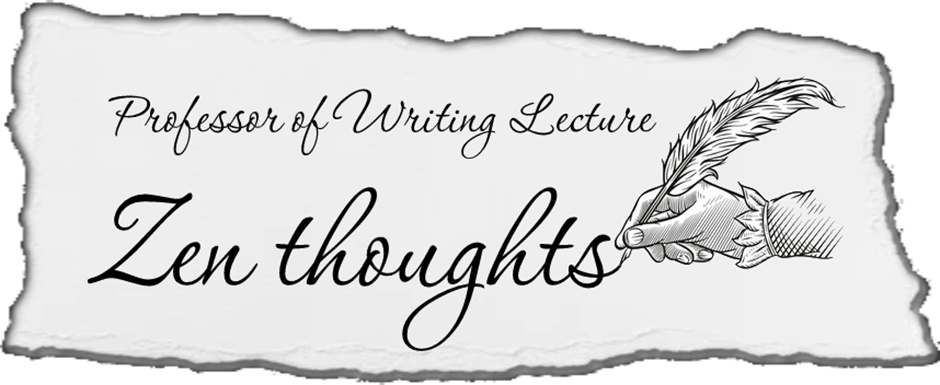Writing Tighter Prose I - Professor of Writing Winter Lecture
Writing Tighter Prose I - Filter Words

Introduction
Welcome to the Winter edition of Zen Thoughts, where, as the Professor of Writing, I break down some fiction writing techniques that might help people improve their writing beyond what the Shadow Academy courses offer. This is the first in a series called ‘Writing Tighter Prose’ and is focusing on line-level editing tips that can make your work more exciting to read, starting with 'filter words'.
What are Filter Words?
Filter words, in short, are unnecessary words that get between the reader and the characters’ experience. They can take away from immersion, reminding us that we’re reading something told to us, rather than experiencing it through the character.
Usually, filter words take the form of a verb that doesn’t do anything besides explaining something that never needed to be explained. Some common examples include saw, heard, thought, felt, spotted, etc. If we’re writing in first person or third-person limited points of view, we rarely actually need these words. If it’s on the page, the reader knows that the character has seen or heard it, and doesn’t need to be explicitly told. This is not the case in the somewhat archaic third-person omniscient point of view, where the distance between narrator and character is more defined.
An Example with and without Filter Words
Everything is more clear with an example. Here’s one I made up using lots of filter words:
He saw the pursuing craft get closer and closer. He decided there was only one way to escape – to jump to hyperspace. He realised the droid brain knew it too when he heard the hyperdrive screech into action and saw the viewports fade into a cerulean hue. He wondered if they made it on time.
Now here’s the same passage, but with the highlighted words removed:
The pursuing craft got closer and closer. There was only one way to escape – to jump to hyperspace. The droid brain knew it too. The hyperdrive screeched into action and the viewports faded into a cerulean hue. Did they make it on time?
Notice how everything feels much more immediate and ‘in the moment’ in the second example. ‘Saw’ and ‘heard’ are implied by those things happening on the page, and ‘decided’, ‘realised’ and ‘wondered’ are shown through direct thought tracking of the character.
What to do About Filtering
In many cases, filtering is something to be cut down on where possible. Using the active voice over the passive voice generally uses fewer unnecessary words, and gets to the action quicker. Look for verbs following the protagonist’s name / pronoun that involve either senses or emotions. Consider whether the narrative reads better without them. Place yourself in the character’s head. Once you’re already there, you don’t need to then step outside to say ‘he saw’, etc. Whatever is happening on the page is the character’s experience (assuming you’re writing in first-person on third-person limited).
Words of Caution
Don’t go too far with this and start banning certain words from your vocabulary. Googling a full list of filter words then going through your story and going on a meticulous hunt to erase every last one is unlikely to improve your writing. The point here isn’t to ban certain words. It’s to recognise when the flow of your prose might benefit from deleting them. There may be times when you should be using words like saw, heard, felt, etc:
- A character might see something out of the corner of their eye, or hear a sound on the edge of hearing, and the reader needs to know that.
- They might actively looking for something. In this case, ‘saw’ takes on a more active role in the narrative.
- You might be writing in a third-person omniscient perspective, in which the story isn’t told from within a character’s head and you need to tell the reader who saw the thing.
- You might be on 499 words of a 500 word requirement.
Always remember that writing stories is an art form and a list of strict rules isn’t the way art is done. These lectures are just to give you something to think about next time you write. You can ignore all of it and still write a good story. But these are tips that I’ve personally found have improved my writing. Have a great Christmas!
Professor Zentru'la
Previous Lectures
You need to be logged in to post comments
AWESOME!!!!! Thank you!!!!